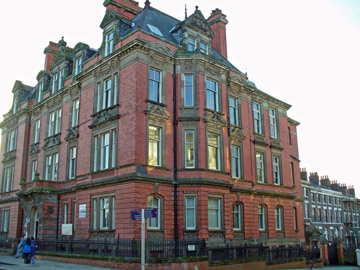 Peter Proctor M.R.C.S. L.R.C.P L.S.A. (7 May 1839 – 26 July 1931), was a British orthodox physician who converted to homeopathy to become a House Surgeon at the Liverpool Homeopathic Dispensary and Medical Officer to the Liverpool Homeopathic Dispensary at 30 Roscommon Street (founded in 1905). Proctor was also Secretary to the Liverpool Homoeopathic Medico-Chirurgical Society (established 1857), and was the President of the Liverpool Branch of the British Homeopathic Society in 1906. He was also a longstanding member of the Birkenhead Literary & Scientific Society and the Birkenhead Art Club.
Peter Proctor M.R.C.S. L.R.C.P L.S.A. (7 May 1839 – 26 July 1931), was a British orthodox physician who converted to homeopathy to become a House Surgeon at the Liverpool Homeopathic Dispensary and Medical Officer to the Liverpool Homeopathic Dispensary at 30 Roscommon Street (founded in 1905). Proctor was also Secretary to the Liverpool Homoeopathic Medico-Chirurgical Society (established 1857), and was the President of the Liverpool Branch of the British Homeopathic Society in 1906. He was also a longstanding member of the Birkenhead Literary & Scientific Society and the Birkenhead Art Club.
Peter Proctor was born in Leeds on 7 May 1839, the son of flour dealer and trader George Proctor and his wife Martha. Peter Proctor’s early education was in his home town, before he proceeded to study medicine at Guy’s Hospital, London.
In July 1862, Peter Proctor was elected a member of the Royal College of Surgeons and received his Licence from the Worshipful Society of Apothecaries. In 1875, he was also awarded the Diploma of the Edinburgh Royal College of Physicians.
Proctor moved to Liverpool in 1866 to help tackle a cholera outbreak in the north of the city using homeopathy. Proctor set up in practice at 13 St. James Road, Liverpool.
In 1867, Proctor wrote a detailed report on “Homeopathy and Cholera in Liverpool” that was published in the British Journal of Homoeopathy. A fighting fund was raised to defray the costs, and a house was taken in the cholera-ravaged district as a temporary dispensary. The Dispensary, assisted by the local Sisters of Mercy (English Order), then leafleted the area, notifying residents that round-the-clock homeopathic aid was available and advising anyone suffering choleraic seizures to apply a bag of hot salt to the abdomen and take 5 drop doses of spirits of camphor, freely distributed by the Dispensary, every 10 minutes. Applicants for relief flocked to the Dispensary, and as Proctor observed:
“The medicines were taken with great confidence, the system having a deep root amongst the poor in this part of the town in consequence of the success of homoeopathy in typhus and other fevers, which are continuously endemic here, but which retire before their formidable rival, Asiatic Cholera.”
The final case Proctor recorded was on October 26, 1867. Throughout the epidemic, Proctor meticulously documented his treatment method and found the remedies Camphora, Arsenicum, Cuprum Aceticum, Aconite, Phosphorus, and Veratrum Album to be effective. Tartar emetic and Secale were disappointing. In total, over the course of almost three months, 156 cases of choleraic diarrhoea (no cases developed into cholera), and 99 cases of cholera were seen by Proctor. Of these, 14 died and 85 recovered, although one of the 14 was a boy of 5 years who recovered due to Proctor’s homeopathic ministrations, but relapsed and died under allopathic treatment. 13 additional cases were transferred to allopaths, 10 of which died.
Proctor was a dedicated homoeopathist. On March 6, 1872, a meeting of the Liverpool Homoeopathic Medico-Chirurgical Society was held at the Dispensary at which a resolution was unanimously passed and signed by the President John William Hayward and Peter Proctor, as Secretary:
“That the medical men, practicing homoeopathy in this neighbourhood, protest in the most positive manner against the sale, in connection with homoeopathy, of any secret remedies such as ‘glykaline,’ ‘neuraline,’ ‘substitute for cod-liver oil,’ and the like, and they request the discontinuance of such practice.”
This letter from Proctor and Hayward was read to the April 1872 meeting of the Homoeopathic Pharmaceutical Society for consideration.
Proctor remained in Liverpool as an homeopathic practitioner for twelve years, before moving to Birkenhead in 1878. He practiced at 17 Hamilton Square, Birkenhead.
In September 1881, Peter Proctor married Liverpool resident Mary Winchester (1845 – 1919). They had no children.
Peter Proctor was a regular attendee at homeopathic meetings. He attended the British Homeopathic Congress in Leamington in 1873, and the British Homeopathic Congress in Manchester in 1875. In 1897 he was President of the British Homeopathic Congress held in Clifton, Bristol. He also attended the Congress of Homeopathy held in Liverpool in 1901.
Procter submitted letters, cases and articles to various homeopathic publications, including On the Therapeutic Part of the British Repertory, A Note on the Preparation of Carbo, The Treatment of Influenza, and he also wrote Discursive Practical Remarks.
Peter Proctor died on 26 July, 1931, at 17 Hamilton Square, Birkenhead.
Of interest:
Rev. G. J. Proctor [no evident relation] was also a supporter of homeopathy and served on the committee of the Hackney Homoeopathic Dispensary in 1872.
Peter Proctor was a Royal Navy Lieutenant in 1810, and he served in Nelson’s Navy.
The Peter Proctor (ex Havik) was a Royal Navy brig, captured by Lieutenant Proctor from the Dutch in 1810, that travelled the World shipping labourers, passengers, and goods.


Leave A Comment